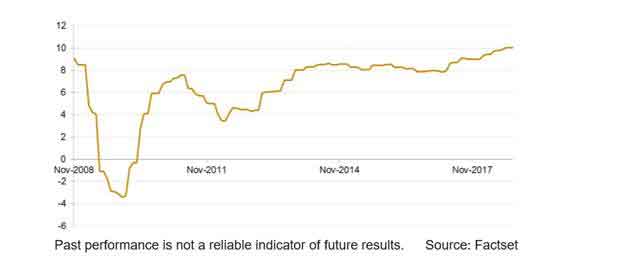Global investors have had a love-hate relationship with Japan for many years. Effectively ignored for two decades since the bubble years of the late 1980s (with some short bursts of enthusiasm in between), the arrival of Shinzo Abe as prime minister in 2012 kindled hopes that this sleeping giant would find its feet, and help unlock the latent potential of its corporate and consumer sectors.
While we have been rather sceptical about the explicit effects of the prime minister’s so-called ‘three arrow’ approach (inflation-focused central bank, stimulus-focused government, and reform-focused growth strategy), we do recognise that there have been positive developments, and indeed growing confidence, within the Japanese economy. The re-election of Abe as leader of his party in September 2018 was reassuring for those seeking continuity – something absent in Japanese politics until relatively recently.
Against this background, in early 2018, Japanese equities hit highs not seen since the early 1990s (as measured by the TOPIX Index). Surely this was proof indeed that the years of subdued growth and corporate statis were in the past?
A robust corporate picture The good news in Japan is, of course, more subtle and nuanced. At an economic level, growth has been fairly modest in recent years; it did pick up early in 2018, but overall the economy has seemed unable to grow in excess of its 1-2% range. However, at the corporate level (and we ultimately invest in companies, not economies), the story is a rather different one.
Indeed, the profit picture in Japan is actually very positive. The return on equity of Japan’s largest companies is expected to exceed 10% – a record high – in the fiscal year to 31 March 2019, as a result of various government measures to encourage companies to boost returns. At the same time, companies are increasingly turning to stock buybacks to absorb some of the excess cash they have built up on their balance sheets. The latest data shows that such buybacks, while still modest, are up 37% year-on-year (as at 30.09.18). Corporate activity in the form of takeovers and mergers has also been picking up, perhaps reflecting the greater presence of foreign shareholders.
Japan’s positive profit picture
TOPIX (Tokyo Stock Price Index) returns on equity (%)

We are optimistic about the outlook for our Japanese investments, and we invest across both larger and smaller companies. Some near-term hurdles pose risks, most immediately the possible fallout from the trade dispute between the US and China, as well as a planned consumption tax hike in 2019 and Upper House elections next July. However, over the longer term these positive trends – together with relatively attractive valuations – are likely to produce attractive returns from Japanese equities.



